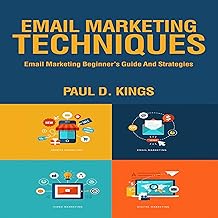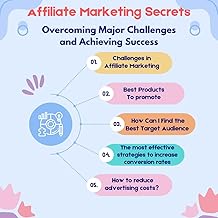Affiliate marketing has revolutionized the way entrepreneurs can generate income online. It’s a business model that allows you to earn commissions by promoting other people’s products or services.
I’ve been in the affiliate marketing game for years, and I can tell you it’s an exciting and potentially lucrative field – but it’s not without its challenges.
Other articles similar to this one can be found at: https://globalaffmktg.com/
The Fundamentals of Affiliate Marketing
Affiliate marketing operates on a simple premise: you promote a product or service, and when someone makes a purchase through your unique affiliate link, you earn a commission. This model creates a mutually useful relationship between merchants, affiliates, and customers.
For merchants, affiliate marketing provides a cost-effective way to expand their reach and increase sales without significant upfront marketing expenses. Affiliates benefit by monetizing their online presence without creating their own products.
Customers often gain access to helpful information and reviews that aid their purchasing decisions.
However, success in affiliate marketing needs more than just plastering affiliate links across the internet. The most successful affiliate marketers provide genuine value to their audience, building trust and authority in their chosen niche. For starters, get a book that outlines the beginning aspects of affiliate marketing and provides step-by-step actions to take to get you progressing in the right direction.
Here is a good book to do just that: https://amzn.to/4iLx0Zn

Note: As an Amazon Associate, I may earn a commission on qualifying purchases.
Choosing Your Niche
Selecting the right niche is crucial for your affiliate marketing success. Your niche should align with your interests and expertise while also having enough market demand.
Here’s how to approach niche selection:
- Identify your passions: Start by listing topics you’re genuinely interested in. Your enthusiasm will shine through in your content, making it more engaging for your audience.
- Assess market demand: Use tools like Google Trends, keyword research platforms, and social media analytics to gauge interest in your potential niches.
- Evaluate competition: Look at existing affiliate marketers in your chosen niche.
While some competition is healthy, an oversaturated market can be challenging to break into.
- Consider profitability: Research the commission rates and average order values in your niche.
Some niches naturally lend themselves to higher earnings potential.
- Think long-term: Choose a niche with staying power.
Trendy topics might offer short-term gains, but evergreen niches provide more sustainable income.
Remember, you don’t need to limit yourself to a single niche. As you grow your affiliate marketing business, you can expand into related areas or even entirely new markets.
I have found a couple of books (see below) on this subject that I have found to be quite helpful.


Note: As an Amazon Associate, I may earn commissions from qualifying purchases.
If you want to join a platform to jumpstart your affiliate marketing pursuits, start here: https://affiliates.maxbounty.com/register?referrer=747225
Building Your Affiliate Marketing Platform
Once you’ve chosen your niche, it’s time to create your online presence. Your platform serves as the foundation for your affiliate marketing efforts.
Here are the key components:
Website or Blog
A dedicated website or blog gives you finish control over your content and branding. It also provides a central hub for your affiliate marketing activities.
When creating your site:
- Choose a memorable domain name related to your niche
- Opt for a reliable hosting provider
- Use a user-friendly content management system like WordPress
- Implement a clean, professional design that’s mobile-responsive
- Optimize your site for search engines (SEO) from the start
Content Strategy
High-quality, valuable content forms the backbone of successful affiliate marketing. Your content should tell, educate, or entertain your audience while naturally incorporating your affiliate products.
You need AI Tools such as content, photos and images and build from there. Here is a great resource: https://galaxy.ai/?ref=gary
Consider these content types:
- Product reviews and comparisons
- How-to guides and tutorials
- Industry news and trend analysis
- Personal stories and case studies
- Roundups and “best of” lists
Consistency is essential in content creation. Develop a content calendar and stick to a regular publishing schedule to keep your audience engaged and coming back for more.
Email List
Building an email list allows you to nurture relationships with your audience and promote affiliate offers directly to interested subscribers. To grow your list:
- Offer a valuable lead magnet (e.g., an ebook, checklist, or mini-course)
- Place opt-in forms strategically throughout your site
- Use exit-intent popups to capture leaving visitors
- Segment your list based on subscriber interests
- Provide consistent value in your emails, not just promotions
- Below is a beginner’s resource regarding formulating Email list campaigns.

Note: As an Amazon Associate, I may earn a commission from qualifying purchases.
Social Media Presence
Social media platforms can amplify your reach and drive traffic to your affiliate content. Choose platforms where your target audience is most active and:
- Share snippets of your content with links back to your site
- Engage with your followers and industry peers
- Use relevant hashtags to increase discoverability
- Experiment with different content formats (e.g., images, videos, stories)
- Consider paid social media advertising to boost your reach
Selecting Affiliate Programs and Products
Choosing the right affiliate programs and products to promote is crucial for your success and credibility. Here’s how to make informed decisions:
- Research affiliate networks: Join reputable affiliate networks like Amazon Associates, Awin/ShareASale, or CJ Affiliate.
These platforms offer a wide range of products and handle payments securely.
- Evaluate commission structures: Look for programs that offer competitive commission rates.
Some niches, like software or high-ticket items, often provide higher commissions.
- Check cookie duration: Longer cookie durations give you a better chance of earning commissions on delayed purchases.
- Assess product quality: Only promote products you believe in. If possible, try the product yourself before recommending it to others.
- Consider your audience: Choose products that align with your audience’s needs and interests.
- Look for promotional resources: Many affiliate programs provide marketing materials like banners, email templates, and product images.
- Read the terms and conditions: Understand the rules of each affiliate program to ensure compliance and avoid issues.
Remember, it’s often better to promote a few high-quality products you truly believe in as opposed to overwhelming your audience with countless options.
Creating Compelling Affiliate Content
The key to successful affiliate marketing comes from creating content that provides value to your audience while effectively promoting your chosen products. Here are strategies for crafting compelling affiliate content:
Product Reviews
Detailed, honest product reviews form the cornerstone of many successful affiliate marketing strategies. When writing reviews:
- Highlight both pros and cons for authenticity
- Include personal experiences and anecdotes
- Use visuals like photos or videos to showcase the product
- Compare the product to alternatives
- Provide clear calls-to-action (CTAs) for interested readers
Comparison Articles
“Best of” lists and product comparisons help readers make informed decisions. When creating comparison content:
- Choose products within the same category or price range
- Create a clear, easy-to-read format (e.g., tables or charts)
- Highlight key features and differences
- Include your personal recommendations
- Link to individual product reviews for more details
How-To Guides and Tutorials
Educational content that incorporates affiliate products naturally can be highly effective. For how-to guides:
- Address a specific problem or goal
- Break down the process into clear, actionable steps
- Show how the affiliate product fits into the solution
- Include tips and best practices
- Consider creating video tutorials for complex topics
Build your How-To library here: https://www.betterworldbooks.com/?utm_source=affiliate&utm_campaign=text&utm_medium=new_used_books&utm_term=1&utm_content=homepage
New & used books. Search for any author!?
Resource Pages
Create comprehensive resource pages that list your top recommended products for specific purposes. These pages can become valuable reference points for your audience and steady sources of affiliate income.
Here’s a great data research firm: https://www.affiliateprogramdb.com/research-service/?ref=vrvzptls
Put in Coupon Code dataxyz for a 10% discount
Case Studies
Share real-world examples of how you or others have benefited from using the affiliate products. Case studies provide concrete evidence of a product’s value and can be highly persuasive.
Remember to always disclose your affiliate relationships clearly and prominently in your content. Transparency builds trust with your audience and complies with legal requirements.
Driving Traffic to Your Affiliate Content
Creating great content is only half the battle – you also need to get it in front of your target audience. Here are effective strategies for driving traffic to your affiliate content:
Search Engine Optimization (SEO)
Optimizing your content for search engines can drive consistent, long-term organic traffic. Focus on:
- Keyword research to target relevant search terms
- On-page SEO (title tags, meta descriptions, header tags)
- Creating high-quality, in-depth content that answers user queries
- Building backlinks from reputable sites in your niche
- Improving site speed and user experience
Social Media Marketing
If your small business needs to increase your company’s public relations exposure.
Here’s an agency that will certainly assist you in that step: http://www.ereleases.com/hello.html
Leverage social media platforms to share your content and engage with your audience:
- Share your latest posts and promotions
- Create platform-specific content (e.g., Instagram Stories, YouTube videos)
- Participate in relevant groups and communities
- Use hashtags strategically to increase visibility
- Engage with followers and respond to comments promptly
Email Marketing
Nurture your email list to drive traffic and promote affiliate offers:
- Send regular newsletters with your latest content
- Create exclusive content for subscribers
- Segment your list to send targeted promotions
- Use compelling subject lines to improve open rates
- Include clear CTAs in your emails
- One of the best Email Marketing programs available today is here:
- https://www.aweber.com/email-templates-smart-designer.htm
Paid Advertising
While organic traffic is ideal, paid advertising can jumpstart your affiliate marketing efforts:
- Use Google Ads to target specific keywords
- Experiment with social media advertising on platforms like Facebook and Instagram
- Try retargeting ads to re-engage visitors who’ve shown interest
- Test different ad formats (e.g., text, display, video)
- Monitor your ROI closely and adjust campaigns as needed
Collaborations and Partnerships
Network with other content creators and businesses in your niche:
- Guest post on relevant blogs to reach new audiences
- Participate in podcast interviews or webinars
- Co-create content with complementary brands or influencers
- Engage in affiliate partnerships with other marketers
Content Repurposing
Maximize the reach of your content by repurposing it into different formats:
- Turn blog posts into video content
- Create infographics from data-heavy articles
- Compile related posts into an ebook or guide
- Share key points from your content as social media posts
Remember, diversifying your traffic sources helps create a more stable and sustainable affiliate marketing business.
Tracking and Analyzing Your Performance
To optimize your affiliate marketing efforts, you need to track your performance and analyze the data. Here’s how to approach this crucial aspect:
Use Affiliate Marketing Tools
Invest in tools that help you manage and track your affiliate links:
- Link cloaking tools to create clean, branded short links
- Link management platforms to organize and track multiple affiliate programs
- Click tracking software to watch link performance across different channels
Implement Analytics
Set up comprehensive analytics to understand your audience and content performance:
- Use Google Analytics to track website traffic, user behavior, and conversions
- Set up goal tracking to watch specific actions (e.g., affiliate link clicks, email sign-ups)
- Implement event tracking to capture user interactions with your content
Monitor Key Metrics
Pay attention to these important metrics:
- Click-through rate (CTR): The percentage of visitors who click on your affiliate links
- Conversion rate: The percentage of clicks that result in sales or desired actions
- Average order value (AOV): The average amount spent per transaction
- Earnings per click (EPC): The average amount you earn for each click on your affiliate links
- Return on investment (ROI): For paid advertising campaigns
Regular Reporting and Analysis
Set aside time regularly to review your performance:
- Create weekly or monthly reports to track progress
- Identify top-performing content and products
- Analyze traffic sources to focus on the most effective channels
- Look for patterns or trends in your data
- Use A/B testing to optimize your content and promotions
Adjust Your Strategy
Use the insights from your analysis to refine your approach:
- Double down on what’s working well
- Experiment with new content formats or promotion strategies
- Discontinue or revamp underperforming campaigns
- Seek out new affiliate programs or products based on your audience’s interests
Remember, data-driven decision-making is key to long-term success in affiliate marketing.
Scaling Your Affiliate Marketing Business
As your affiliate marketing efforts start to gain traction, you’ll want to scale your business to increase your income. Here are strategies for growth:
Expand Your Content Production
Increase your content output to cover more topics and products:
- Develop a content creation system to streamline your process
- Consider outsourcing content creation to freelance writers or virtual assistants
- Explore new content formats (e.g., video, podcasts) to reach different audience segments
Diversify Your Affiliate Programs
Don’t rely on a single affiliate program or product:
- Research and join new affiliate programs in your niche
- Explore high-ticket affiliate offers for potentially larger commissions
- Consider promoting digital products or services for higher profit margins
Automate and Systematize
Use tools and processes to make your business more effective:
- Implement social media scheduling tools to maintain a consistent presence
- Use email marketing automation to nurture leads and promote offers
- Create standard operating procedures (SOPs) for recurring tasks
Build a Team
As your business grows, consider bringing on help:
- Hire virtual assistants for administrative tasks
- Work with freelance writers, designers, or developers
- Consider bringing on a part-time or full-time employee for key roles
Explore New Traffic Sources
Diversify your traffic sources to reduce reliance on any single channel:
- Experiment with new social media platforms
- Try different paid advertising channels
- Explore offline marketing opportunities (e.g., speaking engagements, local events)
Develop Your Own Products
Consider creating your own digital products to complement your affiliate offers:
- Ebooks or online courses related to your niche
- Software tools or apps that solve problems for your audience
- Coaching or consulting services
One basic area to start your affiliate marketing journey is with new and used books. Click here for a great source: https://www.betterworldbooks.com/?utm_source=affiliate&utm_campaign=text&utm_medium=new_used_books&utm_term=1&utm_content=homepage
New & used books. Search for any author!?
Network and Build Relationships
Cultivate relationships within your industry:
- Attend conferences and networking events
- Join mastermind groups or online communities
- Reach out to brands for exclusive affiliate partnerships or sponsored content opportunities
Remember, scaling your affiliate marketing business takes time and effort. Focus on sustainable growth and always prioritize providing value to your audience.
Overcoming Common Affiliate Marketing Challenges
While affiliate marketing offers great potential, it also comes with its share of challenges. Here’s how to navigate some common obstacles:
Dealing with Competition
- Focus on building your unique brand and voice
- Provide more in-depth, valuable content than your competitors
- Explore underserved niches or sub-niches within your market
- Build strong relationships with your audience to foster loyalty
- You need this guidebook in your arsenal for branding your affiliate marketing pursuits: https://amzn.to/4gW8BPe

- Note: As an Amazon Associate, I may earn a commission from qualifying purchases.
- If you want to join a platform to jumpstart your affiliate marketing pursuits, start here: https://affiliates.maxbounty.com/register?referrer=747225
Maintaining Authenticity
- Only promote products you genuinely believe in
- Be transparent about your affiliate relationships
- Share both pros and cons of the products you recommend
- Focus on solving your audience’s problems, not just making sales
Adapting to Algorithm Changes
- Diversify your traffic sources to reduce dependence on any single platform
- Stay informed about industry news and platform updates
- Focus on creating high-quality, valuable content that will stand the test of time
- Build an email list to have direct access to your audience
Dealing with Seasonal Fluctuations
- Plan content and promotions around peak seasons in your niche
- Diversify your affiliate offers to include products with year-round appeal
- Create evergreen content that provides consistent traffic and income
- Use slower periods to plan, create content, and improve your skills
Staying Motivated
- Set clear, achievable goals and track your progress
- Celebrate small wins along the way
- Connect with other affiliate marketers for support and motivation
- Remember why you started and visualize your long-term success
Keeping Up with Industry Changes
- Follow industry blogs, podcasts, and thought leaders
- Attend webinars and conferences to stay updated on trends
- Experiment with new technologies and platforms
- Be willing to adapt your strategies as the industry evolves
By anticipating and preparing for these challenges, you’ll be better equipped to build a sustainable and successful affiliate marketing business.
Ethical Considerations in Affiliate Marketing
Maintaining ethical standards in your affiliate marketing practices is crucial for long-term success and building trust with your audience. Here are key ethical considerations:
Transparency
- Always disclose your affiliate relationships clearly and prominently
- Explain how affiliate links work and how you benefit from them
- Be honest about your experience with the products you’re promoting
Honesty in Reviews and Recommendations
- Provide balanced, honest reviews that include both pros and cons
- Don’t exaggerate product benefits or make false claims
- Share your personal experiences and opinions genuinely
Respecting Your Audience
- Don’t spam your audience with constant promotions
- Prioritize providing value over making sales
- Respect your audience’s privacy and data
Compliance with Regulations
- Familiarize yourself with FTC guidelines and other relevant regulations
- Ensure your affiliate disclosures meet legal requirements
- Stay informed about changes in advertising laws and adjust your practices accordingly
Promoting Quality Products
- Research products thoroughly before promoting them
- Avoid promoting products or services you know to be low-quality or scams
- Be willing to stop promoting a product if you find out about issues with it
Balancing Monetization and Value
- Ensure your content provides value even if readers don’t make a purchase
- Don’t let the potential for commissions compromise your integrity or recommendations
- Focus on building long-term relationships with your audience over short-term gains
By maintaining high ethical standards, you’ll build a reputation as a trustworthy source in your niche, leading to more sustainable success in the long run.
Frequently Asked Questions
What is affiliate marketing?
Affiliate marketing is a performance-based marketing strategy where businesses reward affiliates for driving traffic or sales to their products or services through the affiliate’s marketing efforts.
How much money can I make with affiliate marketing?
Earnings from affiliate marketing vary widely depending on factors like niche, audience size, and marketing skills. Some affiliates make a few hundred dollars a month, while top performers can earn six or seven figures annually.
Do I need a website to do affiliate marketing?
While having a website is beneficial, it’s not strictly necessary. You can do affiliate marketing through social media, email marketing, or even YouTube videos.
However, a website gives you more control and can be a valuable asset in the long run.
How do I find affiliate programs to join?
You can find affiliate programs by searching for “[product/niche] + affiliate program,” joining affiliate networks like ShareASale or CJ Affiliate, or checking if companies you already use offer affiliate programs.
Will affiliate marketing still be profitable in 2025?
Yes, affiliate marketing stays a profitable business model in 2025 and should continue into the future. While competition has increased, there are still many opportunities for those who provide value and build trust with their audience.
How long does it take to make money with affiliate marketing?
The time it takes to start earning from affiliate marketing varies. Some may see their first commission within a few weeks, while others might take several months.
Consistent effort and patience are key.
What are the best niches for affiliate marketing?
Popular and potentially profitable niches include health and wellness, personal finance, technology, travel, and personal development. However, the best niche for you depends on your interests, expertise, and target audience.
To review the many niches available and the associated products and services, start here: https://affiliates.maxbounty.com/register?referrer=747225
How do I disclose affiliate links legally?
To follow FTC guidelines, clearly disclose your affiliate relationships near the top of your content and before any affiliate links. Be transparent about how you may be compensated for recommendations.
Can I do affiliate marketing on social media?
Yes, many affiliates successfully promote products on platforms like Instagram, YouTube, and TikTok. Each platform has its own guidelines for disclosing affiliate relationships, so be sure to follow them.
What’s the difference between affiliate marketing and influencer marketing?
While both involve promoting products, affiliate marketing typically focuses on driving sales through tracked links and earning commissions. Influencer marketing often involves broader brand partnerships and may include flat-fee payments for promotion.
Key Takeaways
- Choose a niche that aligns with your interests and has market potential
- Build a strong online presence through a website, social media, and email list
- Create valuable, high-quality content that naturally incorporates affiliate products
- Diversify your traffic sources and income streams for a sustainable business
- Track and analyze your performance to optimize your strategies
- Scale your business by expanding content, exploring new affiliate programs, and building a team
- Maintain ethical standards and transparency to build long-term trust with your audience
- Stay adaptable and continue learning as the affiliate marketing landscape evolves
- * Please be sure to SAVE this website in your “Favorites” file.
This post contains links. If you click on these links and make a purchase, I may earn a commission at no additional cost to you. Rest assured, I only recommend products or services I believe will add value to my readers. As an Amazon Associate, I may earn a commission from qualifying purchases.
Articles similar to this one can be found at: https://globalaffmktg.com/
